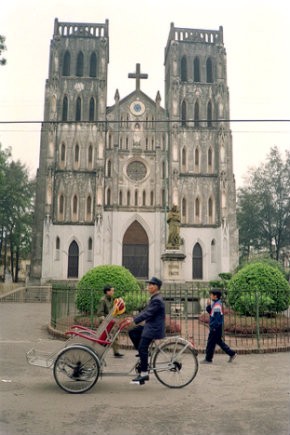The Vietnamese diaspora
Historians argue at length about when the Vietnam War began—or the U.S. role in it—but an excellent claim can be made for 1963. In that year, global media were transfixed by the horrible image of a Buddhist monk burning himself alive in protest against the regime of Ngo Dinh Diem, the president of South Vietnam, who later that same year was assassinated. This crisis, just 50 years ago, set the stage for direct U.S. military intervention.
Of the making of books about Vietnam there is no end, and the response of religious communities in the United States to the war has been amply documented. What gets lost in popular memory is how religious battles within Vietnam itself shaped political attitudes and arguably doomed the anticommunist cause.
Read our latest issue or browse back issues.
Such amnesia is scarcely surprising. In the 1960s, few people paid attention to religion as a political factor. But without understanding the role of religion, and particularly of Catholic Christianity, we miss much of the story of those dreadful years. In its origins, the Vietnam War resembled the later civil-religious strife in Lebanon.
Although Southeast Asia is traditionally Buddhist, a potent Catholic presence dates back at least to the Jesuit missions of the 16th century. Through much of the 19th century, Buddhists and Catholics fought and intrigued against each other, provoking bloody wars and persecutions.
Catholicism grew in numbers and influence with the establishment of the French empire in Indochina. The faith appealed particularly to those who were influential and Westernized. The Catholic presence received a massive setback with the establishment of communist rule in the north of Vietnam after 1954, setting off the first of successive exiles. Buttressed by these new arrivals, the anticommunist regime in the south became aggressively Catholic. Ngo Dinh Diem’s ultraconservative brother was the Archbishop of Hue.
Although Christians made up just 15 percent of the population, the regime gave Catholicism something like established status, dedicating the country to the Virgin Mary in 1959. The government exempted Catholic villages from official burdens, directed external aid toward Catholics and placed heavy restrictions on Buddhist activities. Rowdy Catholic militias demolished Buddhist temples. When Buddhist protests erupted, government forces responded ferociously. When Buddhist monk Thich Quang Duc immolated himself in 1963, it was not a generic protest against dictatorship or human rights abuses but a specific call to end religious persecution.
When communist agents called on Buddhist peasants to rise against Catholic landlords and the regime in South Vietnam, they were preaching to those already half converted. At that stage, they needed say little about Marxism or nationalism.
The communist victory in 1975 was a disaster for the Catholic Church as much as for the Western cause. Catholic leaders were killed, exiled or imprisoned, and the new regime was stridently antireligious.
Vietnam was in the news again last year when the U.S. State Department offered a lengthy catalogue of how religious freedoms have been abused and religious people persecuted, part of explaining the country’s designation as a “country of particular concern” under the International Religious Freedom Act.
Vietnam’s regime is a variant of the Chinese model. It demands that all religious bodies register with the state or risk heavy penalties. The communists target Catholic human rights activists and restrict church activities. Newer Protestant and Pentecostal churches are a particular source of tension, as they are mainly concentrated among ethnic minorities, the Montagnards and Hmong, and the paranoid regime dreads the slightest hint of subversion of separatism.
One response to the religious situation in Vietnam is amazement that Christian churches are healthy enough to be perceived as threatening. Vietnam today has perhaps 8 million Christians, constituting 8 to 9 percent of the population, with a heavy predominance of Catholics.
Catholic structures have maintained themselves very well, to the point of inaugurating new dioceses and opening new seminaries. The country has about a million Protestants. We can only speculate how these numbers would grow if the regime lifted its heavy hand.
Another religious consequence of the war was the Vietnamese diaspora. Worldwide, some three and a half million people claim Vietnamese origins. More than half of these live in the United States, with other large groups in France and Australia. Christians make up over a third of these exile communities. Among Catholics, overseas Vietnamese are highly visible for their loyalty to the church. They are much in evidence in Catholic seminaries in North America and Europe and consequently are heavily represented among younger priests.
In coming decades, white Western Catholics are very likely to encounter these heirs of this rich—and thoroughly Asian—Christian tradition.







